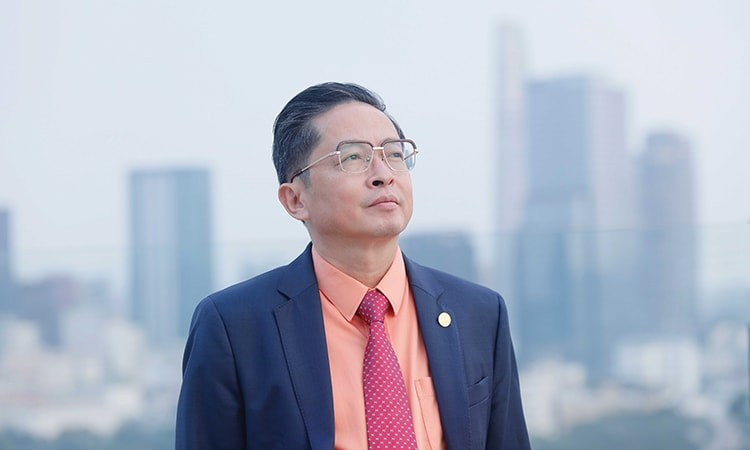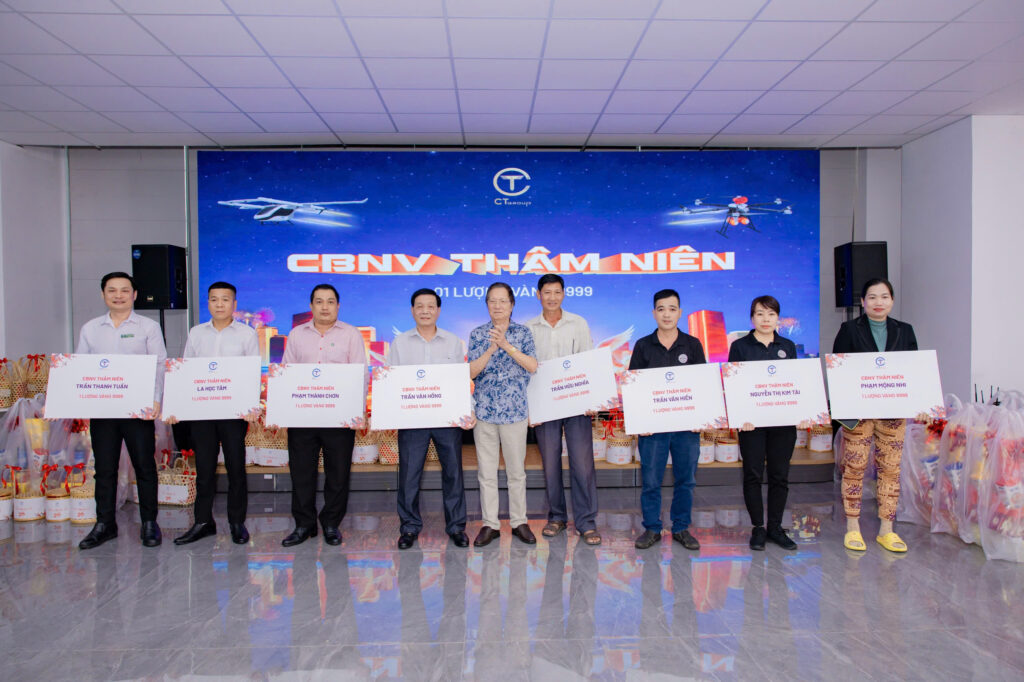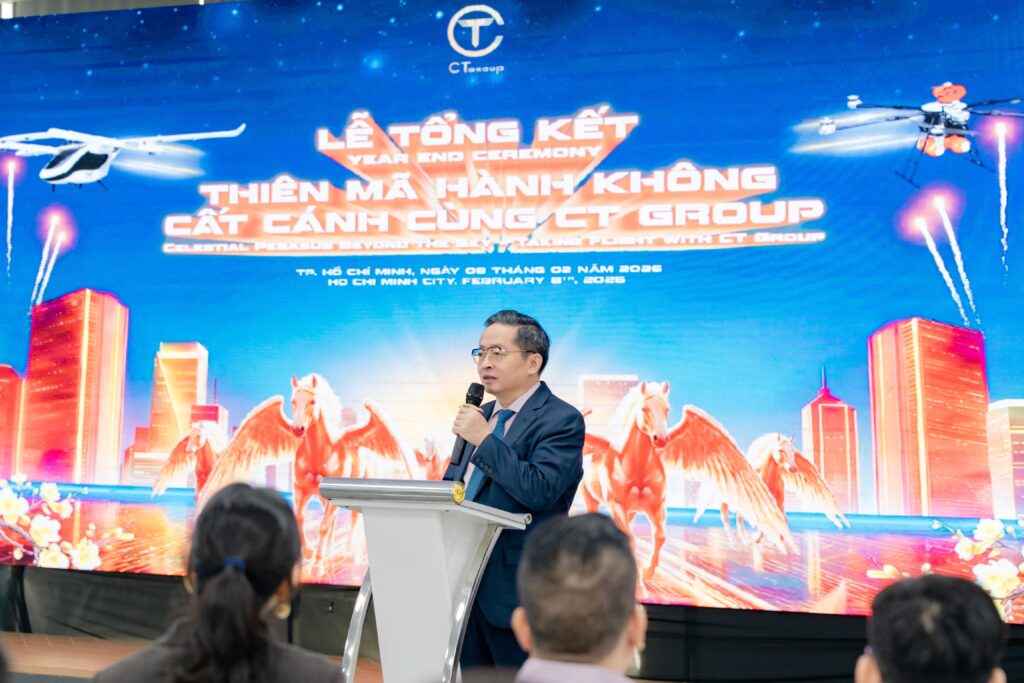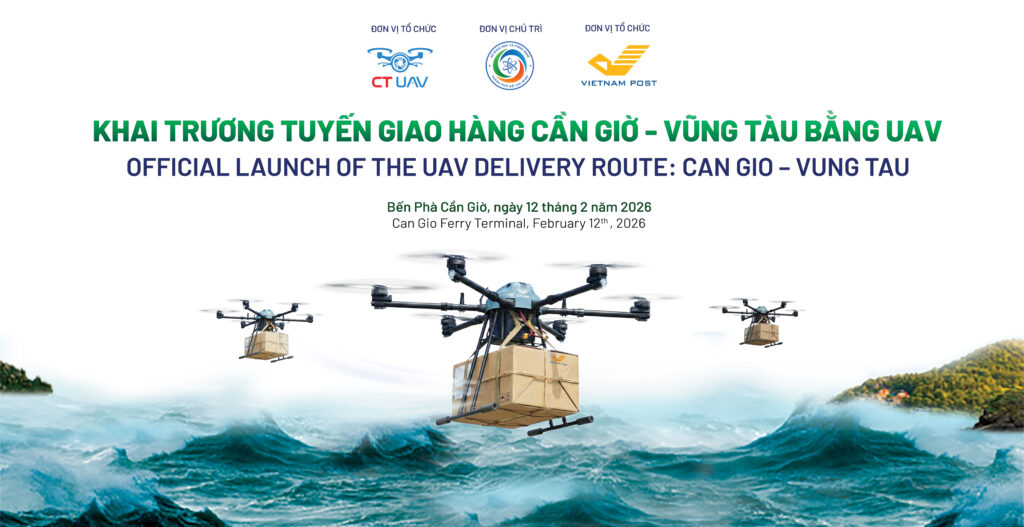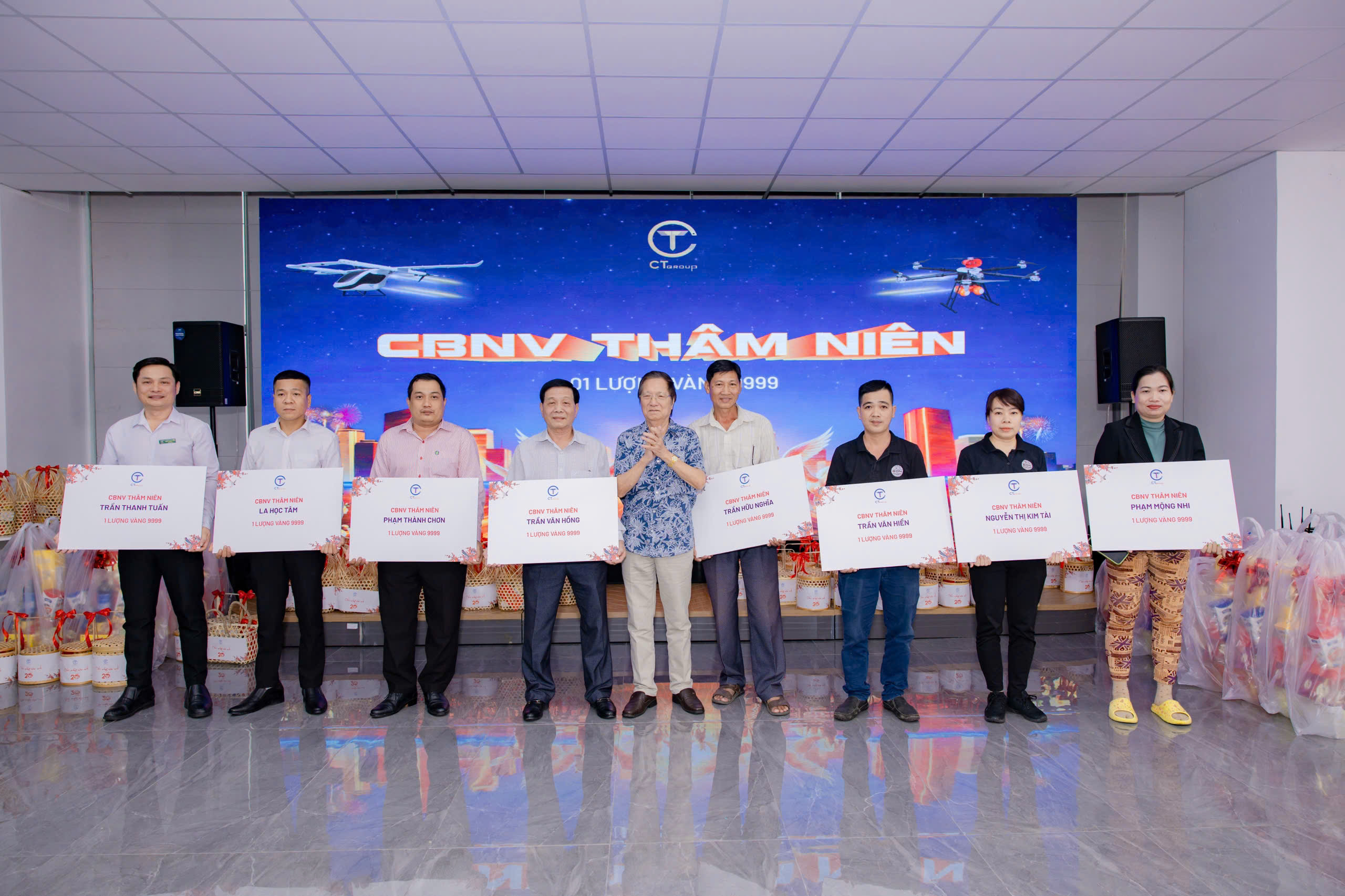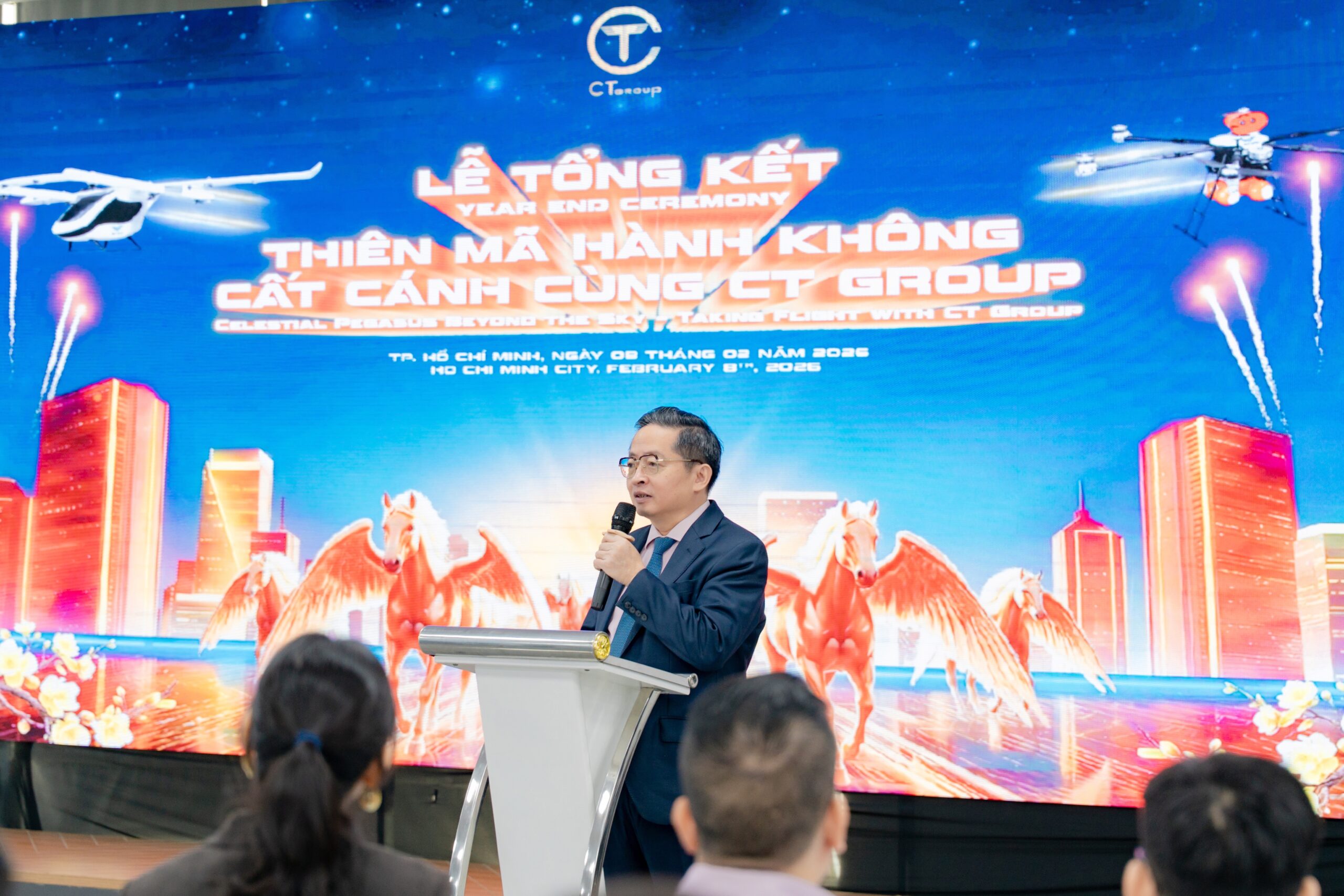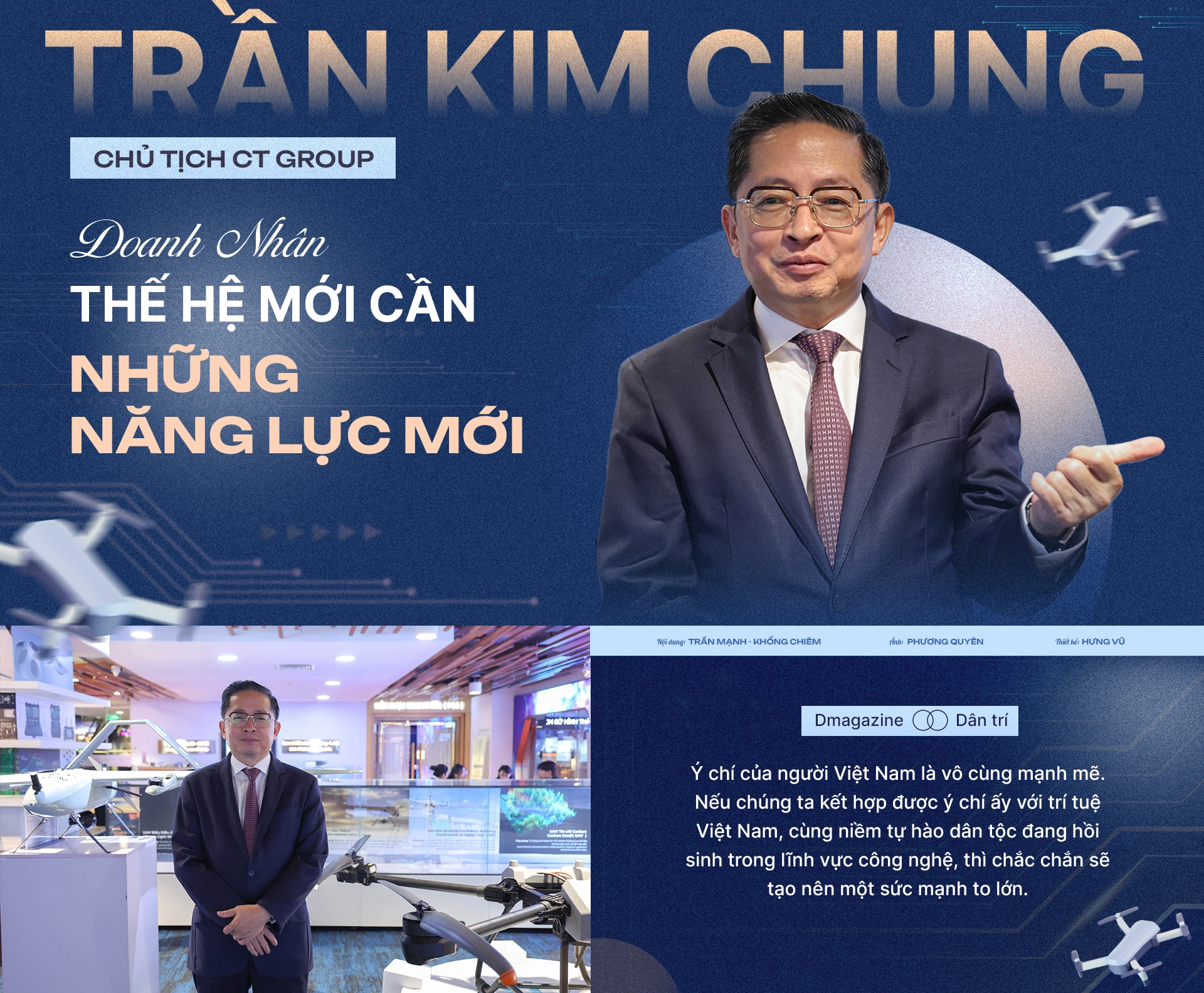
The new generation of entrepreneurs needs to possess the new competencies of the era, proficiency in science and technology, innovative and creative thinking, and the ability to implement digital transformation, according to Mr. Tran Kim Chung – Chairman of CT Group.
A Dan tri reporter had a conversation with Mr. Tran Kim Chung – Chairman of CT Group – the enterprise that “stirred up” attention with an export order of 5,000 UAVs to South Korea, and a memorandum of understanding on low-altitude economic development and digital transformation with Indonesia’s Ministry of National Development Planning.
Mr. Chung confidently believes that national pride is rising when truly valuable technological products are being exported abroad


Q: How do you feel about Vietnamese Entrepreneurs Day, October 13 this year?
– This year’s Vietnamese Entrepreneurs’ Day, October 13, is very special. This year marks the historic milestones of the nation: 50 years since the Liberation of the South and national reunification; 80 years since the success of the August Revolution. But the important thing is not only in those great numbers, it takes place in the context where the whole country is surging forward to enter a new era – the era of the nation’s awakening.
And in this new era, under the leadership of the Party and the State, all forces in society, including the business community, have their own ways to respond and cooperate.
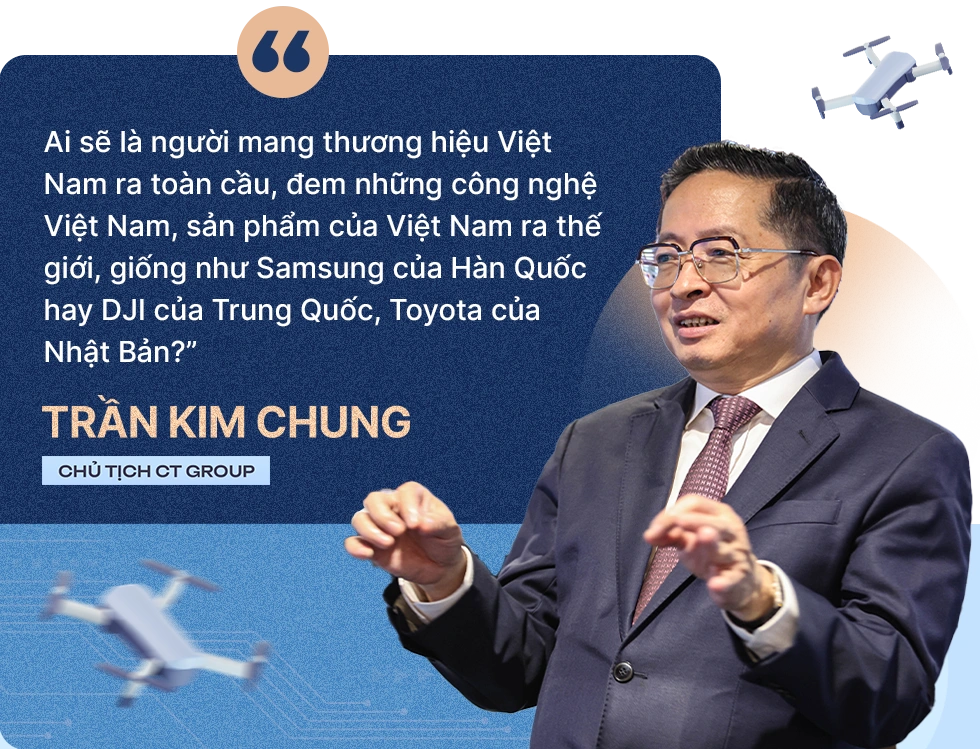

Q: How does CT Group respond to that? Is it by investing in technology and exporting technology through billion-dollar contracts like those your enterprise recently signed?
– Currently, the fields of technology and innovation are not only trends but truly matters of survival. Entrepreneurs in technology must be real warriors. Without entrepreneurs, technological activities cannot be transformed into products, cannot be brought into daily life, and cannot help the nation compete with others.
The Fourth Industrial Revolution has placed every country before a harsh reality either rise and stand firm, or become completely dependent.
We had foreseen that crossroads long ago. Years ago, I visited many universities to call on students that the 4.0 storm was coming; I told them to prepare to “resist the storm,” not to be absorbed in opening milk tea shops or selling fashion. They must “study like crazy,” “do science like crazy,” otherwise they would not be able to withstand the storm of 4.0 when it arrives.
Now, everything has proved true. The Fourth Industrial Revolution has developed unlike any previous industrial revolutions. It is not only about improving labor productivity but also changing everything, changing humanity, changing social structures, and even changing human values and perceptions. Therefore, if we cannot master this 4.0 revolution, it will be extremely dangerous.
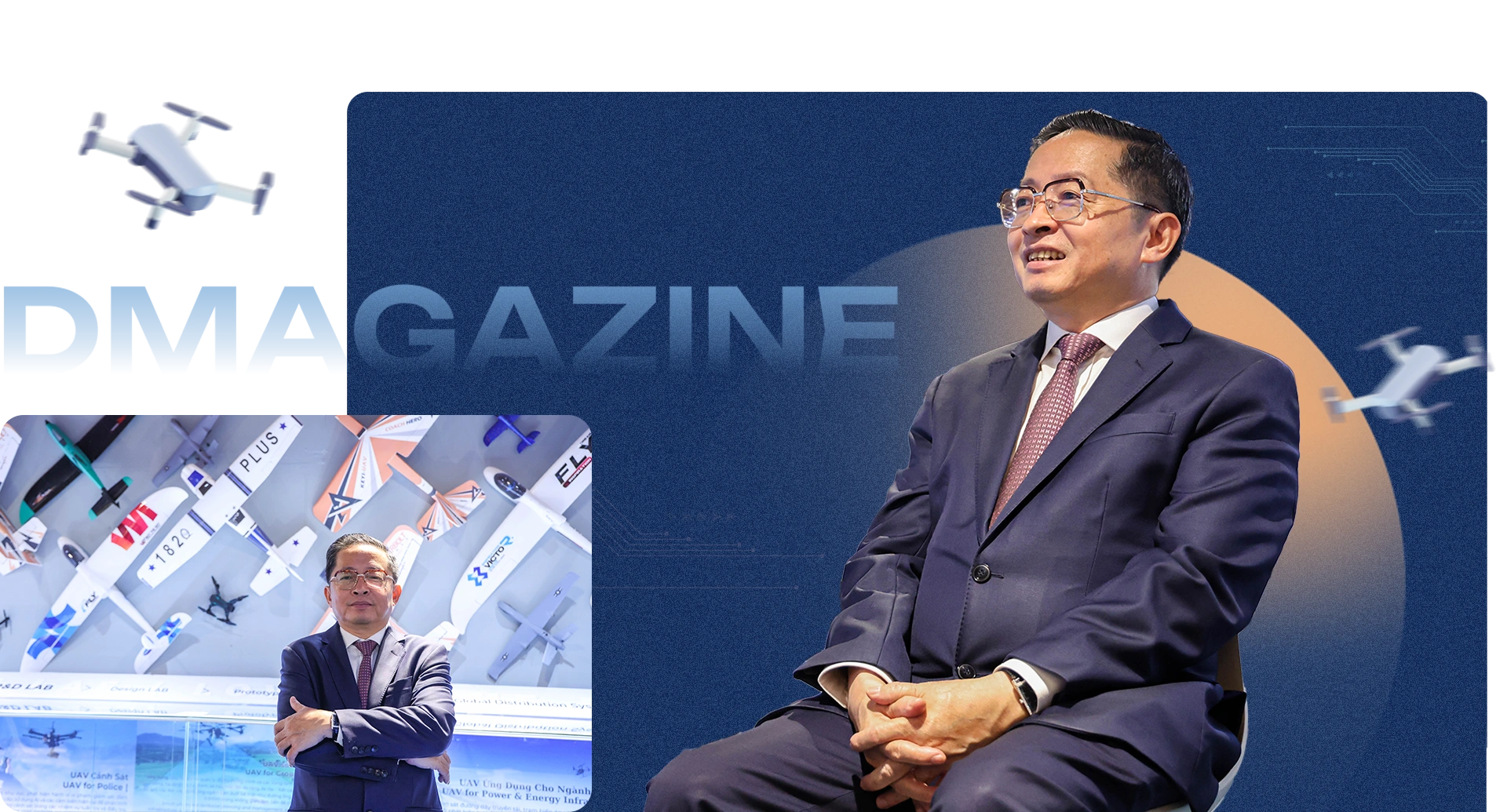
We are nurturing a proposal for a 20-year program called Vietnam Enterprises Go – Global, advancing the world through science, technology, innovation, and digital transformation. By 2045, when the country marks 100 years of independence, Vietnam will stand shoulder to shoulder with global powers, becoming one of the world’s top 10 nations in technology and innovation.
The State has paid great attention to this. The Politburo’s Resolution has made this very clear. And now, the political will of the entire system is very strong, and the expectations of entrepreneurs are high. What remains is the work of entrepreneurs themselves, as Resolution 68 has affirmed the vital role of enterprises as the main driving force of this mission.
Who will bring Vietnamese brands to the world, bring Vietnamese technologies and products to the globe, just like Samsung of Korea, DJI of China, or Toyota of Japan?
It is the entrepreneurs – it is time for them to stand up and take that mission, with or without State support. There is no turning back. If we fail to seize the 4.0 revolution, not only the nation but the whole people will fall behind. So we can only move forward.
We already have an excellent set of Resolutions, and we already have policies using institutions as competitive advantages internationally. Theoretically, our Resolutions are better than many other countries’ policies. However, the implementation remains slow and inconsistent, mainly because local-level execution teams are not yet up to the task.

Q: What are your recommendations to solve those issues?
– The implementers at the middle management level are very important at this stage. How can we change the mid-level public managers? It must be through entrepreneurs, as they are the ones with aspirations and play pioneering roles.
If we can allow entrepreneurs to directly participate alongside mid-level public managers, we can create momentum from the middle layer. If not, it will lead to the phenomenon of “hot head, cold belly, and frozen legs,” meaning we cannot move forward.
I hope that this year’s Vietnamese Entrepreneurs’ Day, which takes place very close to the National Party Congress, will be an opportunity to delicately connect these two issues, creating a truly meaningful and profound linkage.
In reality, we are standing before a major filtration process. As society advances and the nation transforms, those who are slow will inevitably be filtered out. Enterprises operating unethically will be eliminated, and incapable or uncommitted public managers will also have to leave the wheel of progress. That is a necessary law of evolution and essential for collective progress.
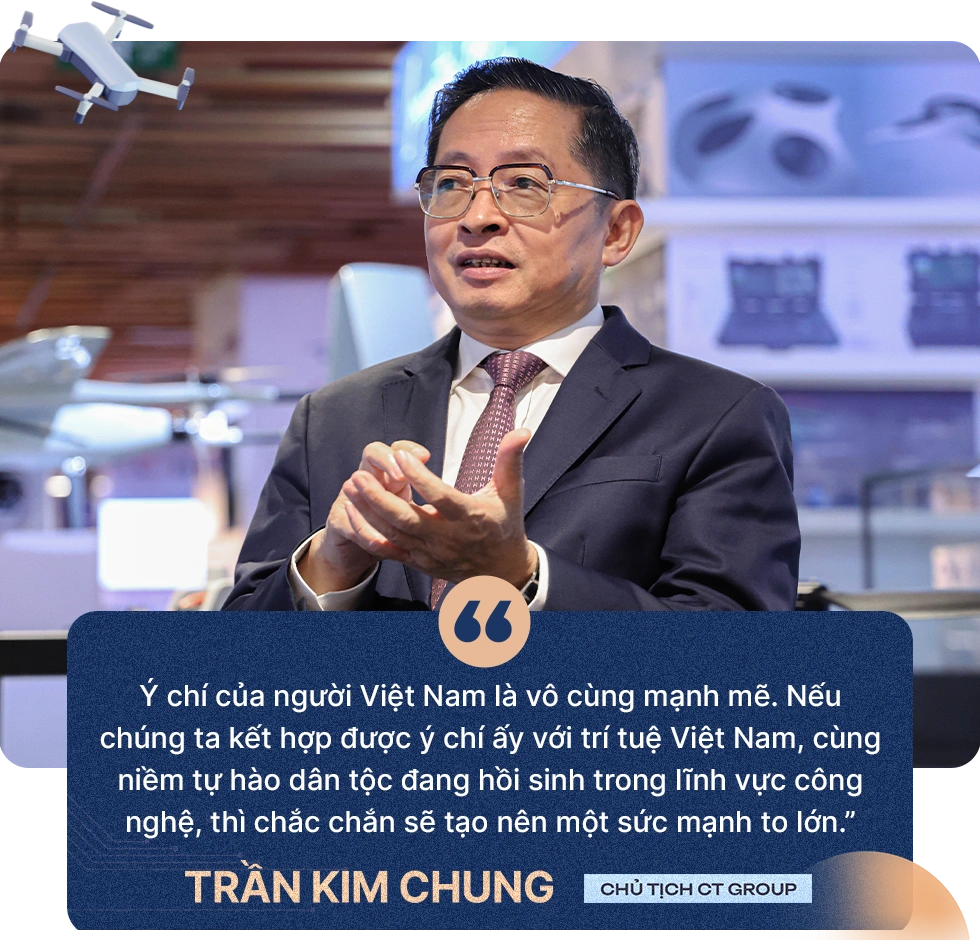
However, fighting negativity must not cause division between entrepreneurs and mid-level public managers. I believe that only when both sides cooperate and accompany each other can we create real improvement. Otherwise, if we continue to go against each other, lacking coordination and mutual understanding, society will remain in the state of “hot head, empty stomach, frozen legs” – meaning passionate but lacking human foundation and motivation to progress.


Q: You mentioned global corporations like Samsung and Toyota. What is your dream when going global? Is it similar to Samsung’s model?
– In technology, when Samsung first started from a textile factory, it was not a high-tech company.
In a short time, the corporation grew rapidly, asserting its position to become one of the world’s leading technology groups, especially in semiconductors, aerospace, and many other high-tech fields.
Looking back at Samsung’s journey, it is a lesson in self-reliance and perseverance, rising through the efforts and intellect of the Korean people. Every time the company launched a new product, it was not only a joy for the business but also a shared pride for the whole nation and government of Korea. They are genuinely proud of what they create.
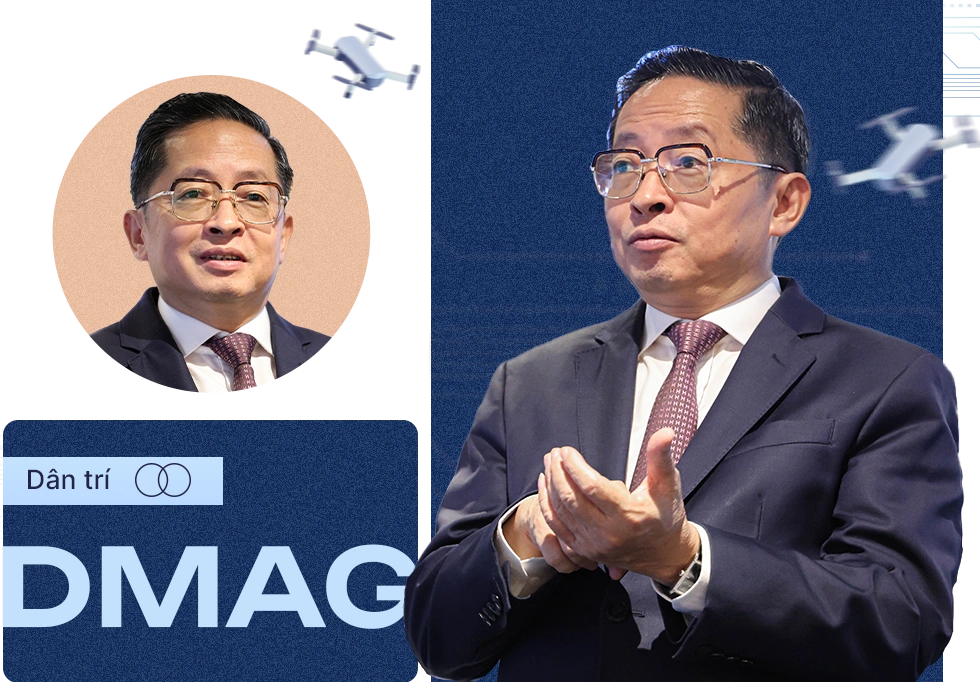
Today, Vietnamese people are gradually regaining that pride as Vietnamese enterprises not only produce world-class products but also expand soft boundaries – global markets even being recognized and appreciated by the world’s most demanding ones.
We receive much encouragement from citizens, attention from intellectuals, stories, articles, even poems they send us. That brings us enormous inspiration and motivation.
To date, we have not received any financial support, funding, or land from the State, yet we clearly feel great consensus and support, especially from the people. I believe national pride is awakening, and that is Vietnam’s “secret weapon.”
The will of Vietnamese people is incredibly strong. If we can combine it with Vietnamese intelligence and the reborn national pride in technology, it will create tremendous strength. For a long time, Vietnam has not produced truly valuable technological products. Now, that moment has returned luckily and meaningfully, especially for the younger generation.
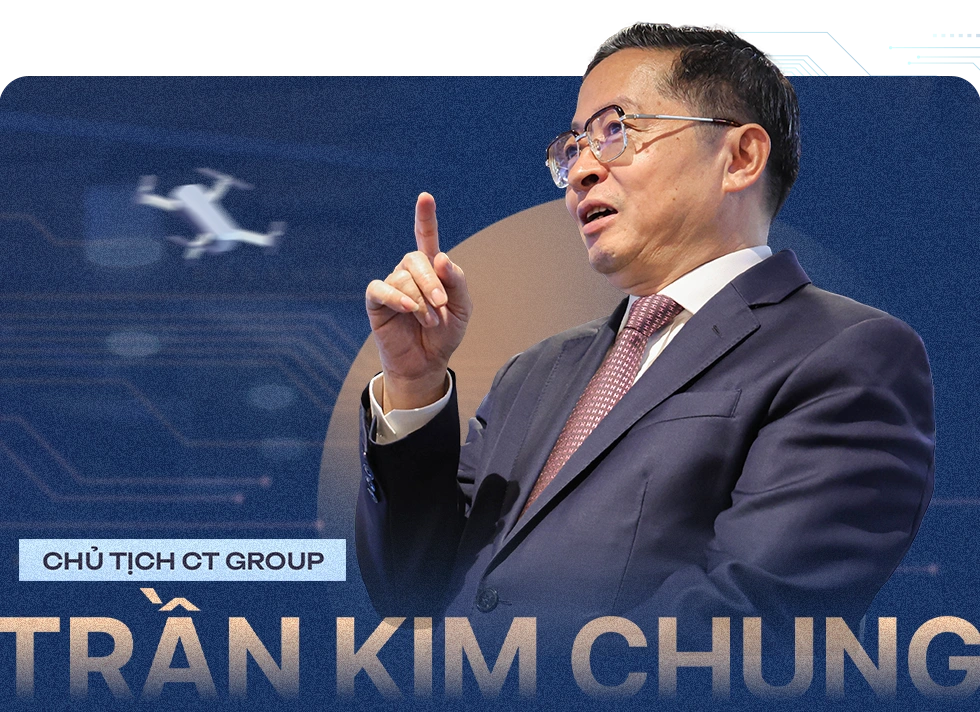
Many young Vietnamese working abroad, researchers or young associate professors at prestigious universities have actively reached out to us, wishing to contribute. They believe Vietnam is standing before a major global opportunity. Many have told us: “Come here, we’ll take care of everything.” They are passionate. Even leading professors aged 70-80 say: “Come, we will fully support you.”
Clearly, that inspiration has returned, and we feel responsible to do something truly meaningful not to betray people’s trust and expectations.

Q: You have often referred to technological sovereignty. With the new wave of technology investment and the push toward globalization, which key technology areas will CT Group focus on, and which core technologies should Vietnam prioritize to master technology and avoid falling behind or becoming dependent?
– Recently, the Government issued a decision selecting 11 core technologies for Vietnam’s development orientation in the coming years, alongside the 3 core technologies already identified this year. I believe that is a very strong and correct policy move.
Clearly, before making that decision, the State consulted many strategic plans for core technologies from advanced nations, listened to input from professors and experts worldwide, as well as contributions from the business community. Identifying 11 core technologies cannot be perfect, but overall it is a very proper step and reflects a commendable beginning.
However, to avoid getting stuck in “administrative corridors,” we need a more open approach that encourages all sectors to participate in development. We should not be overly hasty in imposing tight control, because in reality those 11 core technologies in Vietnam are still at very nascent stages. What is most needed now is to awaken the spirit of creativity and allow individuals and organizations to experiment.
Vietnamese people learn very well, we are always among the top 5 in the world in academic achievements. But the paradox is, the output products, internationally recognized scientific works, and inventions applied into real life are at very low levels in Asia. This is an unacceptable paradox, but at the same time it is a great opportunity for us to change.
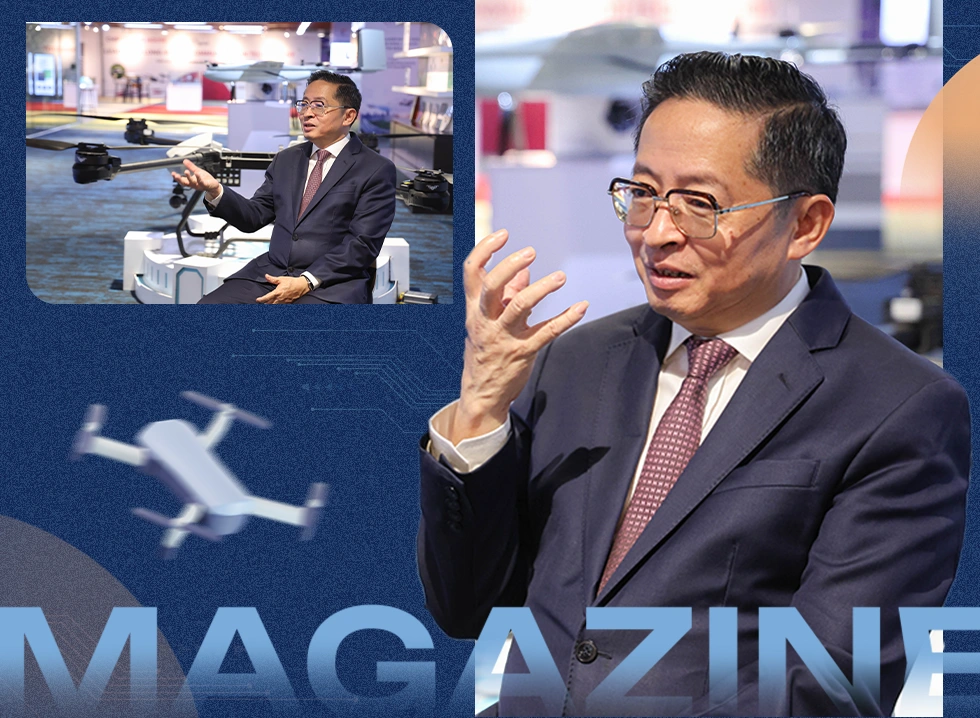
There is too much to do, too many things we can do instead of sleeping 8 hours a day. We need to try harder to solve those problems. Science and technology is a field that requires accumulation and persistent learning; it cannot explode or leap overnight. It demands investment not only of finances but also time, effort, and people.
A good engineer, a good scientist cannot be formed in just a few years of training. We cannot in a day or two turn an ordinary student into a professor. No matter how much money is poured in, one cannot shorten that path.
Therefore, we must simultaneously do two things. First, actively accept and acquire advanced technologies from the world. Second, respect and develop Vietnamese technology.
Lately, the State has made important improvements in the registration and protection of intellectual property rights. I consider that a commendable step. In countries like the U.S., protection of intellectual property is set at extremely high levels. In China and many other countries, technology confidentiality is viewed as a pillar of national policy. Many of their laws on diplomacy even revolve around technological diplomacy how to prevent technology from leaking beyond borders, and ensure the best technology is assimilated to serve national development.
In Vietnam, the central government has recognized the importance of this issue. However, at the provincial level, attention to intellectual property is still limited. Therefore, we need to intensify programs of intellectual property training, especially at local levels. If we do not have full awareness of the value of intellectual property, it will be very difficult to receive technology, as well as to create intellectual products recognized outwardly.
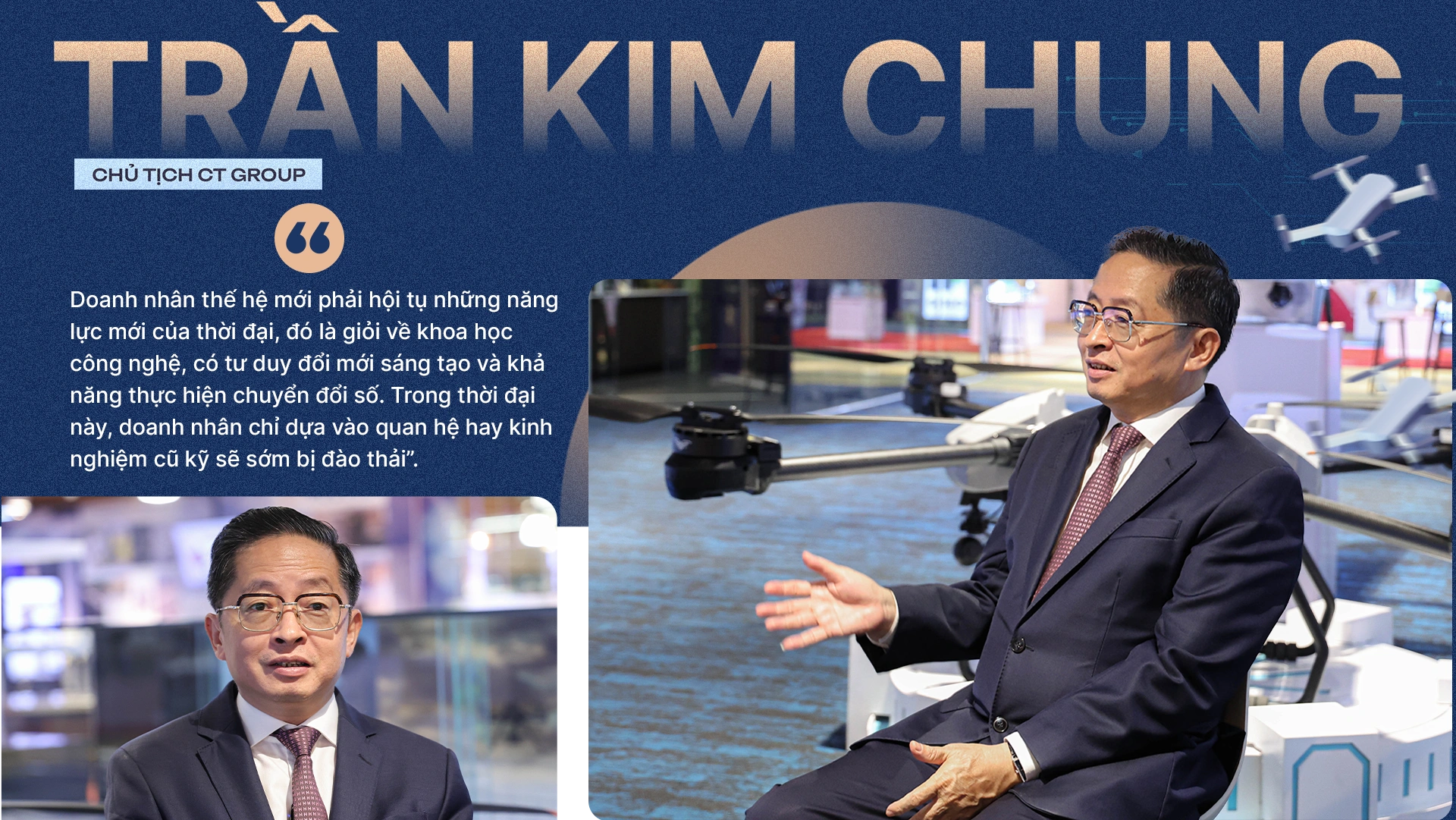


Q: In your process working in technology, what difficulties and challenges has the company encountered? What are your suggestions to remove common obstacles for technology-producing enterprises?
– We have many times proposed to State management agencies and have also received many positive responses.
However, as you know, science and technology is a domain full of risks. Spending money is terrifying, but after spending, one may not even get a good product. And when a good product is obtained, it is not guaranteed to sell, and even if it sells, it might not be sustained for long.
What I worry about most is the phenomenon of doing technology as a trend. We have witnessed the scenes: everyone plants pepper then cuts pepper, everyone invests in wind turbines then solar power. If now everyone does technology without direction, where will we go?
This field has undergone many fluctuations. If we identify early and have proper solutions, we can avoid the situation where the State wants to support technology enterprises but the target group is too numerous, too mixed, making policy execution extremely difficult.
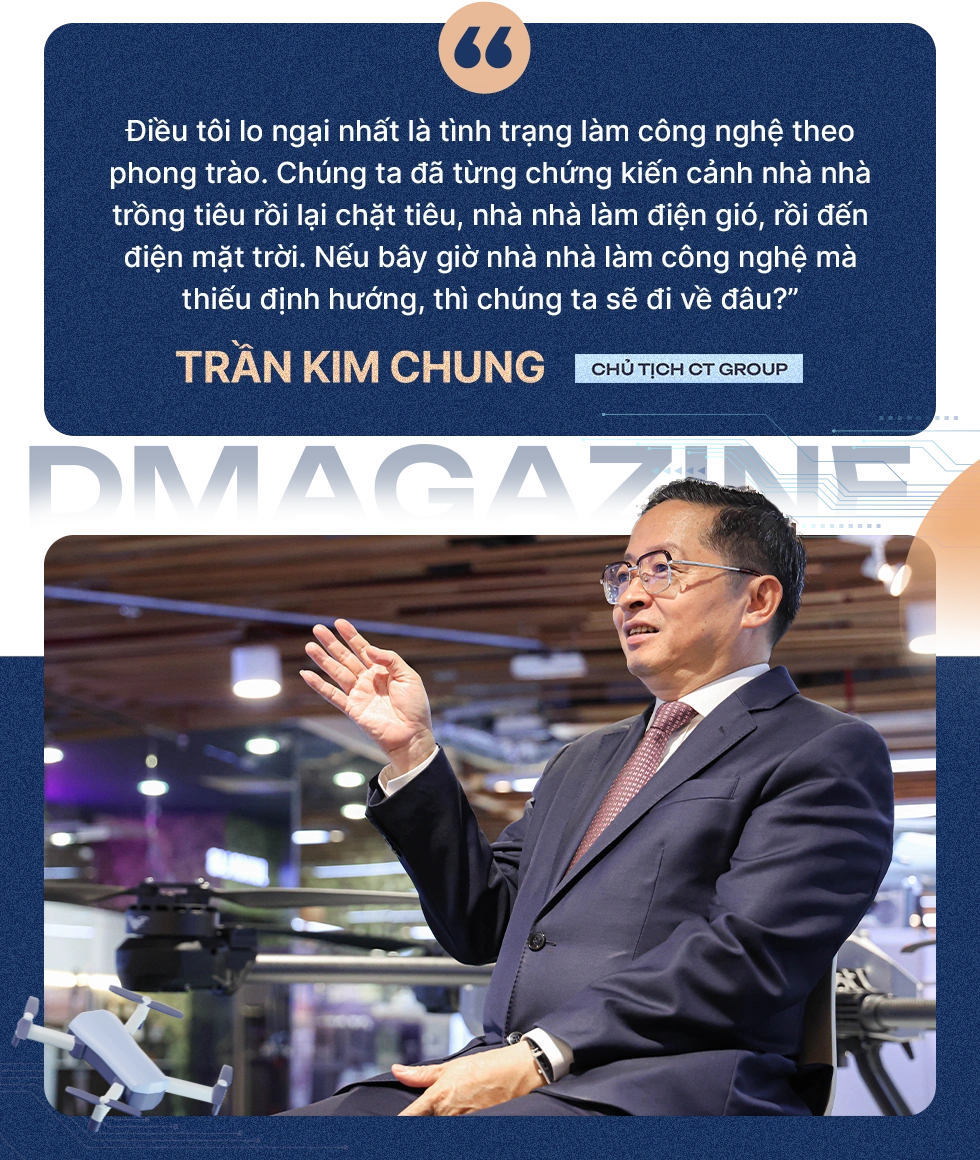
“What I worry about most is the phenomenon of technology as a trend. We have seen households plant pepper then cut pepper, then invest in wind, then solar. If now everyone uses technology without direction, where will we go?”
Another common paradox: enterprises are busy in the laboratory but have no time to “run the mechanisms,” “lobby policies.” I believe the State already has many increasingly practical measures and solutions and will soon recognize and remedy this.
For start-ups, they are also an important resource in the technology ecosystem. However, they need clear policy orientation and guidance to avoid waste of resources. The failure rate of start-ups in Vietnam currently exceeds 90%, showing that significant changes are needed in the way of support and policy implementation. Many proposals have been made to improve the orientation system for the innovation start-up movement.
However, regarding core technologies which the State is calling for development, currently the number of participating enterprises is still very small because these are foundational domains requiring large and deep resources. Therefore, the most feasible way is cooperation: those with ideas should link with enterprises with capacity to jointly implement.
We are encouraging a model of cooperative incubation. We will mentor to avoid risks and waste, at the same time identify strategic products and high-creativity research projects.

Q: Is that a concrete manifestation for entrepreneurs to participate in a great national undertaking? Do you think the country is entering a new opportunity period?
For 33 years, we have quietly done everything wholeheartedly for the country without expecting preferential treatment. Our science, technology and innovation activities started many years ago.
When major resolutions and directives appear, we are among the units that enthusiastically respond, because we already have all the foundations.
As for dedication, we speak little and act chiefly. Currently, CT Group is one of the largest sponsors in universities in Vietnam. At the same time, we are also one of the enterprises with a very high investment ratio in core technology. Among the 11 core sectors, currently we lead in semiconductors, UAVs, low-altitude space economy, national digital twin, biotechnology, carbon credits and other very difficult sectors. We fervently hope that the State will soon place orders.

Q: You have been silent and industrious for decades; on this special Vietnam Entrepreneurs Day of this year, could you share your proudest science & technology achievements?
– Currently, UAV is an industry with very high growth speed. It is not only a new economic driver, but also plays many more roles, such as national defense capability.
In the UAV sector, we can say we are leading in Vietnam. We have 16 industries related to UAV, 16 product lines, and many products within each line. We have complex products such as manned UAVs, transport UAVs, industrial UAVs, digital transformation UAVs, power-grid UAVs, energy UAVs.
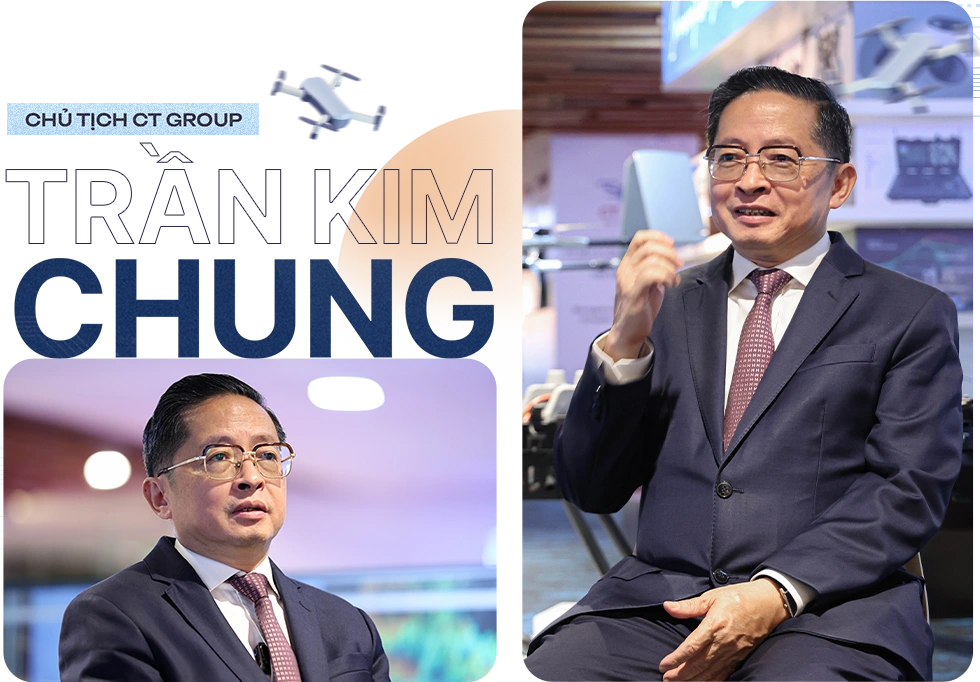
Currently, CT UAV is mastering 6 core technology areas of the UAV industry: aerospace technology, electronics & microchips, artificial intelligence, energy technology, telecommunications, and battery technology. These technologies are all very advanced.
We believe that within 24 months, the Vietnamese UAV industry will not fear any competitor in the region and the world. We design many special, proprietary technologies of Vietnam.
We also have many customers. The contract signed with South Korea is smaller than what we signed with Indonesia. In Indonesia, we signed in the space economy sector cooperation to develop all 16 product lines, not just one line like in Korea. In the near future, we will negotiate and sign more large contracts.

Q: Finally, what qualities do you think entrepreneurs must have in the new era, the new epoch?
– It’s very difficult to define the quality of an entrepreneur by a single formula, because it also depends on the industry, the environment, and each person’s circumstances. Some entrepreneurs possess inherent qualities, but many must continuously learn and train to become true entrepreneurs.
However, I believe that entrepreneurs of the new generation must converge to the new competencies of the era: be proficient in science and technology, have innovative thinking, and the ability to execute digital transformation. These are unavoidable elements. In this era, entrepreneurs who rely only on connections or old experience will soon be eliminated.
________________________
Theo dõi CT Group trên Facebook để cập nhật thêm thông tin và tin tức mới nhất!


